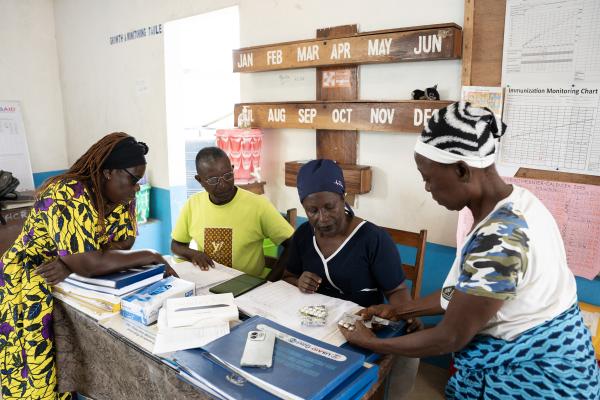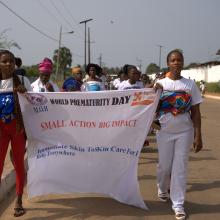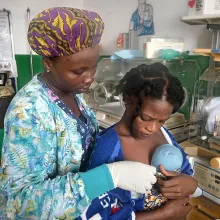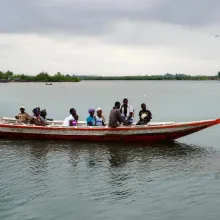Liberia’s health system is classified as fragile. The 2023 Health Equity and Social Determinants of Health Assessment Report notes that the Ebola Virus Disease Outbreak of 2014-2015 and the coronavirus disease pandemic of 2020-2023, coupled with under-investments, a demotivated health workforce, and frequent stockouts of essential drugs and medical supplies, have further weakened the health system, limiting access to quality healthcare. These challenges are even more severe in Southeastern Liberia, particularly in Maryland County, where 9 out of 10 people are impoverished.
Over the past ten years, primary health care service delivery in Maryland County has experienced a significant transformation, primarily due to the accompaniment model implemented by Partners In Health (PIH) Liberia, in collaboration with the Government of Liberia, the Ministry of Health, and the Maryland County Health Team.
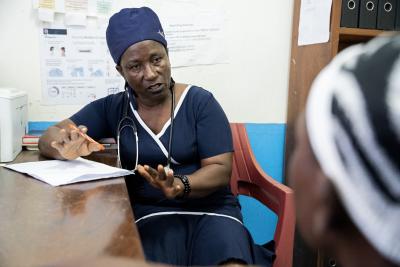
Martina Wesseh, Officer in Charge of Edith Wallace Health Center, in consultation with a patient in her office.
Luther N. Mafalleh / PIH
Martina Wesseh, the Edith Wallace Health Center’s Officer In Charge (OIC), recollected her firsthand experience and the improvements she has witnessed in primary health care access since becoming a midwife. She reflects on the strengthened collaboration between Partners In Health (PIH) Liberia and the Government of Liberia through the Maryland County Health Team at the center.
Initially known as Karloken Health Center, the facility faced significant challenges. “There were several challenges at Karloken Health Center several years ago,” Martina noted. “Staffing, clinical and medical supplies, you name it.
“I mean, we used to provide prescriptions for every case so that patients could go out there to get the items before we treated them, including even emergencies. I can say this is in the past since PIH started supporting this facility in 2018”, she recounted.
Only Martina and two other professionals, Annie F. Kollie and Buchanan Nebo, managed the workload. Martina recalls that they often provided prescriptions for nearly all ailments, yet it was distressing to see patients abandoning their prescriptions along the road because they couldn’t afford the medications. This troubling situation improved in 2019 when PIH decided to stay in Liberia to support the Government of Health in strengthening the health system.
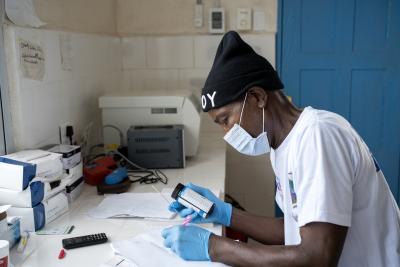
Lab Technician J. Valentine Poka conducts a urine dipstick test at Edith Wallace Health Center.
Luther N. Mafalleh / PIH
At the end of 2024, the Health Center had 21 staff offering life-saving services to a population of approximately 6,067. The team comprises nine individuals on the Government of Liberia (GOL) payroll, while ten others are incentivized by Partners In Health (PIH). Additionally, one individual is paid by a non-profit organization and still volunteers. Martina mentioned that PIH provided her with incentives for several years before she moved to the GOL payroll.
Martina stated that PIH’s support has improved the health center by providing sufficient medical supplies and expanding the previously confined pharmacy.
“When you enter the pharmacy now, you will see that the place is spacious,” Martina noted.
This expansion has been crucial in accommodating the growing number of patients.
Additionally, OIC recalls from 2023 when a woman suffering from postpartum hemorrhage was saved using an anti-shock garment provided by PIH. “I can remember last year [2023], we had a woman bleeding in pregnancy, called Antepartum hemorrhage. It was the anti-shock garment that was given to us by PIH that we used to rescue that case, or else we would have had a maternal death,” she emphasized.
“If you are a professional person, you have the knowledge, but if you don’t have the equipment, you will not achieve your goal,” Martina continued
Martina recalled the challenging times when obtaining simple medical supplies (drugs and other equipment) was difficult, leading to tragic maternal deaths.
Reflecting on another case, February 9, 2017, Martina recalled how the lack of equipment contributed to the death of a patient being referred to Boniken, a nearby clinic.
“Like in the past, even to get a cannula was very difficult for us,” Martina stated,
Martina remembers trying to refer a woman in labor to the next clinic, but sadly, she died before the ambulance could reach its destination. They previously provided prescriptions to about 20 patients who visited the facility daily due to the lack of drugs.
Over the years, the situation has significantly improved due to the partnership between PIH and the Maryland County Health Team. Martina reports that the patient load has nearly tripled with the availability of medications and other essential supplies, increasing from 20 to about 60 patients daily.
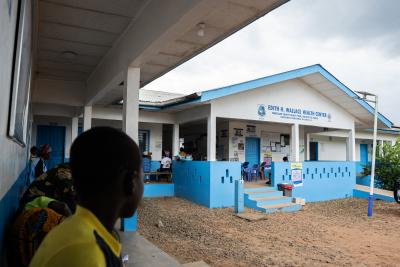
Patients at Edith Wallace Health Center wait for their turns to get their medical results.
Luther N. Mafalleh / PIH
She shared a specific case of a woman from Lower River Gee County who suffered from postpartum hemorrhage and needed to be referred to Pleebo Health Center. Consequently, they called for ambulance support. The woman asked how much she would need to pay for the ambulance fuel, recalling her previous experiences at home.
“I told her you are not going to pay anything, and she was shocked,” Martina narrated. “The ambulance came and carried her free of charge.”
Martina Wesseh’s eyewitness account emphasizes the importance of proper staffing, medical supplies, and compassionate care in enhancing primary health care outcomes, especially in Maryland County, Southeastern Liberia.
The Edith Wallace Health Center has an annual targeted antenatal care/check-up (ANC) of 303, with a monthly delivery target of 23 and 273 per annum.
In close partnership with the government, PIH continues transforming Maryland, an area with the lowest number of health care providers in the country, into a vibrant health system with top-notch care for the region and neighboring Ivory Coast.
There is still much work to be done. Join us in making dignified health care a fundamental human right. Our late Co-founder once said, “With rare exceptions, the most significant achievements on this planet will come from working together—in a word, partnership.”
